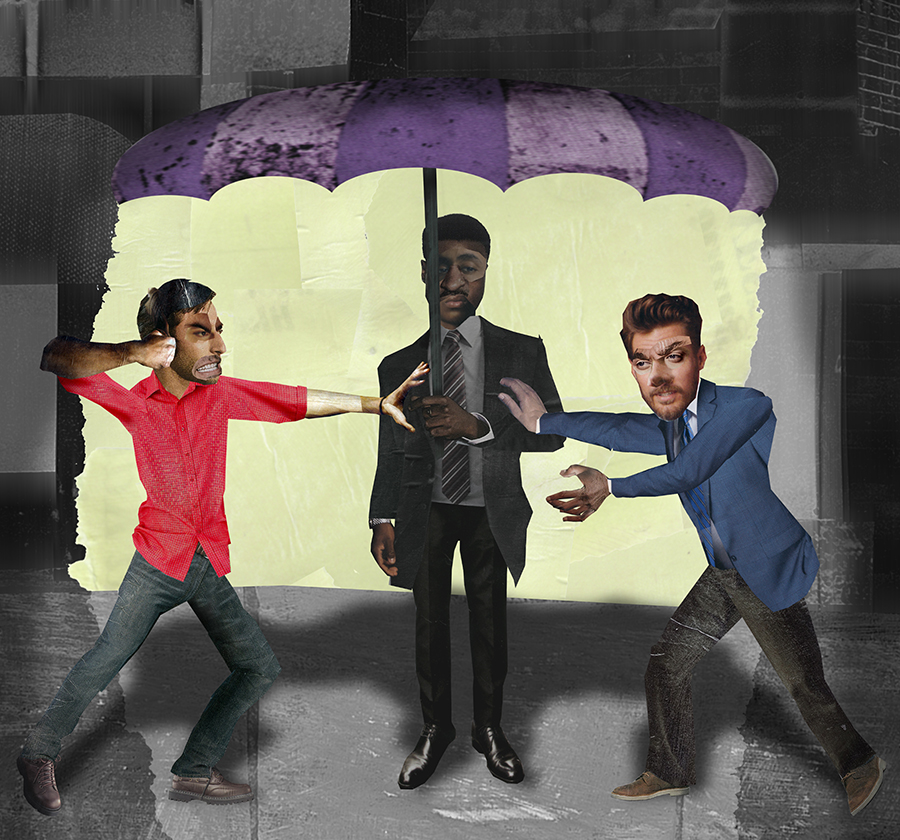
Resolution, by artist in residence Jason Skinner. Creative Commons Attribution-ShareAlike 4.0 International Licence.
Journalism has to change – this is something I’ve argued for years and tried to put into practice since launching Tomorrow.
One of those changes is in the way we react to stories of conflict in the community. Sometimes we report on the fights, sometimes we ignore arguing neighbours. But instead, what we could do, is be mediators.
Huh? Reporters solving disputes? That usually gets a chuckle. But it is no great stretch of the imagination because we do it all the time.
North American journalism has seen the rise of the concept of “solutions journalism” while local papers around the world routinely make calls on behalf of the “afflicted”, with a call from the press frequently resolving a problem before it ever makes it to print or to broadcast.
I wrote mediation into the core principles of Tomorrow because I believe journalism can more proactively help people solve problems. I took an introductory training course with Sacro1 in 2015 and am even more firmly convinced the two spheres are complementary.
But the Mediate 2015 conference2 in Scotland raises further questions beyond initial ones for the practicality. Two issues in particular apply to journalism and the goals of this site: theory and power.
Read our news coverage of the Mediate 2015
The first is, like mediation, Tomorrow is founded on principles and core beliefs that define journalism and its practice. But, theory “is not your sales pitch”, as Professor Elizabeth Stokoe told the conference.3 Tomorrow practices what it preaches, but that doesn’t yet mean readers understand or value both. This extends to trying to explain how mediation would work within and alongside journalism, something I will continue my work to develop as a theory but more importantly practice.
[Tweet “Tomorrow practices what it preaches, but that doesn’t yet mean readers understand or value both.”]The second issue is power. Language is the biggest one perhaps, and as Dr Tamara Relis4 told the conference, it is one aspect of lawyers operating in “parallel worlds” to people hoping to resolve disputes through mediation.
And her language used to describe this problem was equally from a position – an academic one – of power.
She said: “In contrast, the litigants, who are most often paying for these services – who are, at least theoretically those that the civil justice system is there to serve, to assist, – in contrast to the professional actors, are predominantly unsophisticated in litigation and mediation and thus do not know in advance what they should be doing or what they can be doing during the processing of these cases, which in my examples are life altering cases.”
In the news coverage of the conference, I trimmed that quote down to its base level, because the original is a dense description of a dense legal language and system. It has to be unpacked twice. I have the power to report, accurately, but the responsibility to report in a way that will engage anyone, regardless of their background.
Reporters are in positions of power – we are educated and trained to arranged words to tell stories, and those have power. We have access to situations, locations and experiences many others wouldn’t. There are already types of power dynamics in any mediation, so for journalism to insert itself into the process makes it even more complicated and potentially dangerous.
But is a marriage of mediation and journalism worth pursuing? Yes. Because the alternative is one of standing only to the sidelines to observe. We don’t do that anyway, with columnists telling communities what to believe and how to vote, and with approaches such as solutions journalism, where we tell readers, listeners or viewers the way to solve problems. We are in the heart of communities but we frequently assume that means we know best. Mediation means the community knows best and then journalism could, in many cases, report that.
Prof Stokoe said the word “willing” most often got people from “no” to “yes” about the potential for mediation. So, are you willing to consider how reporters could solve problems in communities? Are you willing to help us balance our power and that of others? And are you willing to view journalism in new ways? I hope there is power in these theories.
- Completed mediation skills (40 hours) course delivered by Scottish Community Mediation Centre and awarded five credits at SCQF Level 6. The centre is part of Sacro (Safeguarding communities – reducing offending). ↩
- Original conference website. ↩
- Wired talk from November 2015 of similar but shortened content to that of the conference ↩
- Website listing some of Dr Relis’s publications. ↩

